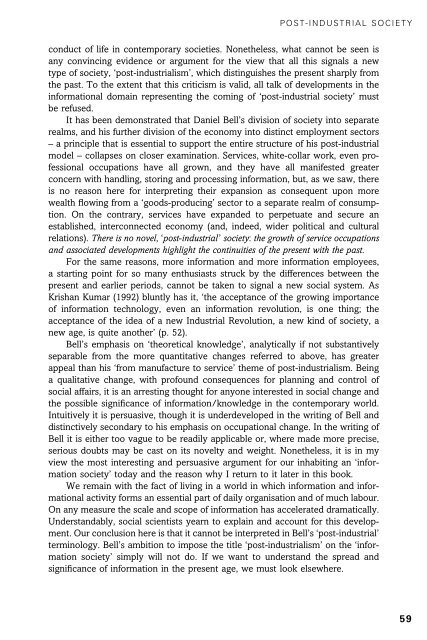Theories of the Information Society, Third Edition - Cryptome
Theories of the Information Society, Third Edition - Cryptome
Theories of the Information Society, Third Edition - Cryptome
You also want an ePaper? Increase the reach of your titles
YUMPU automatically turns print PDFs into web optimized ePapers that Google loves.
POST-INDUSTRIAL SOCIETY<br />
1<br />
1<br />
1<br />
2<br />
1<br />
1<br />
conduct <strong>of</strong> life in contemporary societies. None<strong>the</strong>less, what cannot be seen is<br />
any convincing evidence or argument for <strong>the</strong> view that all this signals a new<br />
type <strong>of</strong> society, ‘post-industrialism’, which distinguishes <strong>the</strong> present sharply from<br />
<strong>the</strong> past. To <strong>the</strong> extent that this criticism is valid, all talk <strong>of</strong> developments in <strong>the</strong><br />
informational domain representing <strong>the</strong> coming <strong>of</strong> ‘post-industrial society’ must<br />
be refused.<br />
It has been demonstrated that Daniel Bell’s division <strong>of</strong> society into separate<br />
realms, and his fur<strong>the</strong>r division <strong>of</strong> <strong>the</strong> economy into distinct employment sectors<br />
– a principle that is essential to support <strong>the</strong> entire structure <strong>of</strong> his post-industrial<br />
model – collapses on closer examination. Services, white-collar work, even pr<strong>of</strong>essional<br />
occupations have all grown, and <strong>the</strong>y have all manifested greater<br />
concern with handling, storing and processing information, but, as we saw, <strong>the</strong>re<br />
is no reason here for interpreting <strong>the</strong>ir expansion as consequent upon more<br />
wealth flowing from a ‘goods-producing’ sector to a separate realm <strong>of</strong> consumption.<br />
On <strong>the</strong> contrary, services have expanded to perpetuate and secure an<br />
established, interconnected economy (and, indeed, wider political and cultural<br />
relations). There is no novel, ‘post-industrial’ society: <strong>the</strong> growth <strong>of</strong> service occupations<br />
and associated developments highlight <strong>the</strong> continuities <strong>of</strong> <strong>the</strong> present with <strong>the</strong> past.<br />
For <strong>the</strong> same reasons, more information and more information employees,<br />
a starting point for so many enthusiasts struck by <strong>the</strong> differences between <strong>the</strong><br />
present and earlier periods, cannot be taken to signal a new social system. As<br />
Krishan Kumar (1992) bluntly has it, ‘<strong>the</strong> acceptance <strong>of</strong> <strong>the</strong> growing importance<br />
<strong>of</strong> information technology, even an information revolution, is one thing; <strong>the</strong><br />
acceptance <strong>of</strong> <strong>the</strong> idea <strong>of</strong> a new Industrial Revolution, a new kind <strong>of</strong> society, a<br />
new age, is quite ano<strong>the</strong>r’ (p. 52).<br />
Bell’s emphasis on ‘<strong>the</strong>oretical knowledge’, analytically if not substantively<br />
separable from <strong>the</strong> more quantitative changes referred to above, has greater<br />
appeal than his ‘from manufacture to service’ <strong>the</strong>me <strong>of</strong> post-industrialism. Being<br />
a qualitative change, with pr<strong>of</strong>ound consequences for planning and control <strong>of</strong><br />
social affairs, it is an arresting thought for anyone interested in social change and<br />
<strong>the</strong> possible significance <strong>of</strong> information/knowledge in <strong>the</strong> contemporary world.<br />
Intuitively it is persuasive, though it is underdeveloped in <strong>the</strong> writing <strong>of</strong> Bell and<br />
distinctively secondary to his emphasis on occupational change. In <strong>the</strong> writing <strong>of</strong><br />
Bell it is ei<strong>the</strong>r too vague to be readily applicable or, where made more precise,<br />
serious doubts may be cast on its novelty and weight. None<strong>the</strong>less, it is in my<br />
view <strong>the</strong> most interesting and persuasive argument for our inhabiting an ‘information<br />
society’ today and <strong>the</strong> reason why I return to it later in this book.<br />
We remain with <strong>the</strong> fact <strong>of</strong> living in a world in which information and informational<br />
activity forms an essential part <strong>of</strong> daily organisation and <strong>of</strong> much labour.<br />
On any measure <strong>the</strong> scale and scope <strong>of</strong> information has accelerated dramatically.<br />
Understandably, social scientists yearn to explain and account for this development.<br />
Our conclusion here is that it cannot be interpreted in Bell’s ‘post-industrial’<br />
terminology. Bell’s ambition to impose <strong>the</strong> title ‘post-industrialism’ on <strong>the</strong> ‘information<br />
society’ simply will not do. If we want to understand <strong>the</strong> spread and<br />
significance <strong>of</strong> information in <strong>the</strong> present age, we must look elsewhere.<br />
59
















